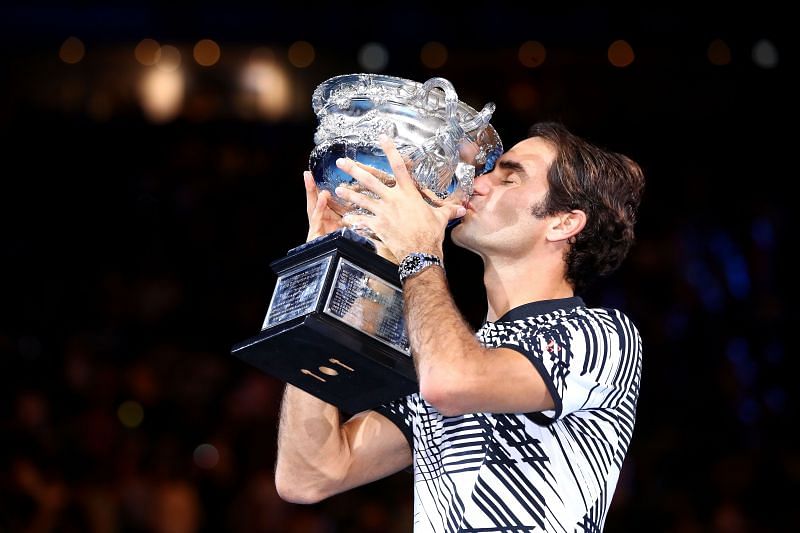
5 most crucial points won by Roger Federer in his career
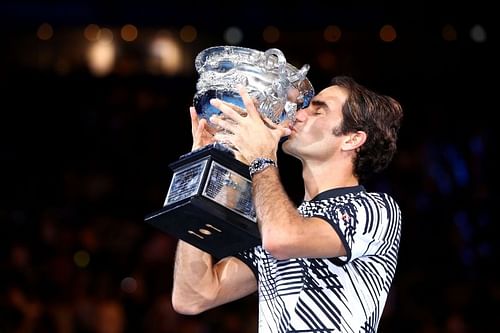
Over the course of his phenomenal career, Roger Federer has won a truckload of titles and matches to cement his place as one of the greatest players ever. But while it is easy to remember all his achievements and laurels, the same cannot be said about the building blocks of those victories - the individual points he put together through a combination of skill and mental strength.
There are some points which stand above the rest, and which deserve special mention. These are the points which gave him the biggest wins of his career, which in turn played a great role in making him the legend that he is today.
When Federer looks back at his illustrious career, he might recall a few points and wonder what might have been if they hadn’t gone his way. On that note, here's looking at the five most crucial points won by Roger Federer in his career:
#5 Roger Federer vs Pete Sampras, Wimbledon 2001 4r, 5-6 in 1st set tiebreaker
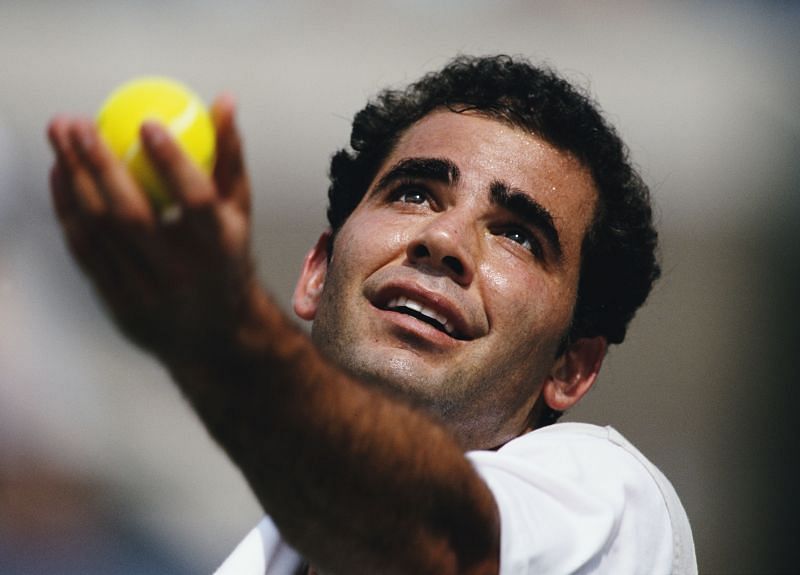
Defending champion and top seed Pete Sampras was looking to win a record eighth Wimbledon title in 2001. Between him and the last eight stood a young Swiss boy by the name of Roger Federer.
Federer had won the Wimbledon junior championship in 1998 and was also seeded 15th, but pretty much everyone expected him to be brushed aside by the mighty American.
That was not to be as Roger Federer prevailed in five difficult sets 7-6 (7), 5-7, 6-4, 6-7 (2), 7-5. In a match with so many sets and points played it becomes difficult to pin-point any specific moment as more crucial than the others, but there is one point that stands out.
The Crucial Point: The score was 6 games all and 6-5 in the first set tiebreak, in favor of Sampras. Federer had to serve to stay in the set and he did just that - with a nerveless delivery that just clipped the outside of the service line.
Watch from 3:47 in the video below:
Reason: Winning the opening set against defending champion Sampras - on Centre Court no less - was a huge confidence booster. Federer used that confidence to eventually reach his first ever Wimbledon quarterfinal - before going on to win eight titles there over the next two decades.
#4 Roger Federer vs Juan Martin del Potro, London Olympics 2012 semifinal, 4-4 in 2nd set tiebreaker
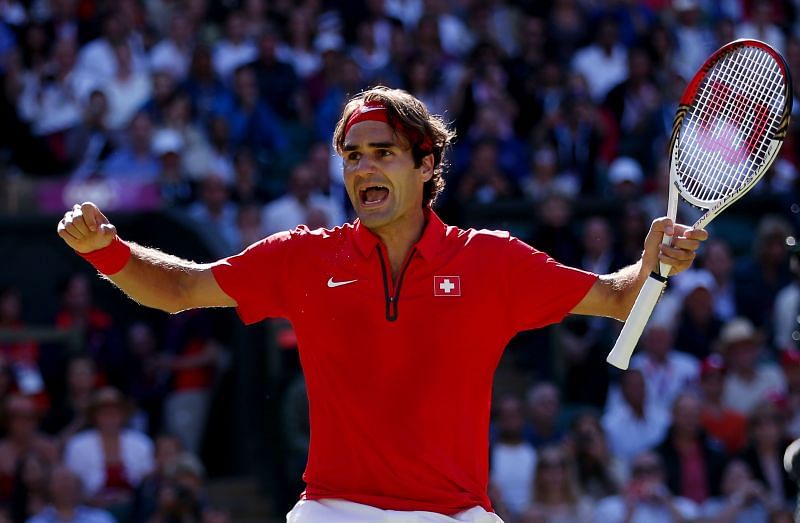
While Roger Federer had won the doubles gold in 2008, a medal in the singles event still eluded him. Coming into the London Olympics on the back of a Wimbledon triumph, the Swiss a favorite for a medal - but he road to the eventual silver was a very tough one.
Juan Martin del Potro refused to budge in the semifinals, and took the match way beyond four hours. In the end Roger Federer somehow held his nerve to finally clinch a singles medal for his country at the Olympics.
The Crucial Point: Del Potro had won the first set 6-3, and the score was 4-4 in the second set tie-break with the Swiss having just messed up an easy volley. Federer was three points away from being knocked out of contention for the gold medal, and wasn't timing his shots particularly well.
Federer then missed his first serve, and on the second serve Del Potro managed to hit a strong return to the Swiss' backhand - by far his weaker wing. But Federer remained calm and painstakingly maneuvered the rally in his favor, before finishing the point at the net with an easy volley.
Watch from 14:50 in the video below:
Reason: If Federer had given the mini-break to Del Potro at that time, the Argentine would have been two points away from victory. More importantly, both of those would have been on his serve, which was proving very difficult for Federer to deal with on the slick grass.
But Federer was clutch when it mattered the most, and he eventually won the match by the scoreline of 3-6, 7-6, 19-17 - to win his first and only individual medal for Switzerland.
#3 Roger Federer vs Andy Roddick, Wimbledon 2009 final, 8-8 in 5th set

Bidding to win a record 15th Grand Slam, Roger Federer found a surprisingly stubborn and spirited Andy Roddick on the other side of the net at Wimbledon 2009. After more than four sets of tennis, the Swiss had been unable to break the American’s serve.
In those days the deciding set didn't have a tie-breaker, which meant Federer had to break the Roddick serve to win the title. The point in contention, however, took place on the Federer serve.
The Crucial Point: The game was finely poised at 8-8 in the fifth set. A few errors from Federer suddenly saw Roddick race to a 15-40 lead on the Swiss' serve; the American was inches away from breaking the Federer serve.
But two gigantic first serves from the Swiss saved the day for him - the second of which was followed by an absolutely clutch swing volley that took the wind out of Roddick's sails.
Federer held serve in that game before ultimately going on to win the set 16-14. Watch from 17:30 in the video below:
Reason: The biggest record in tennis was at stake.
Roger Federer had not been able to break Roddick’s serve (until the final game of the match) until then. And if he had dropped his own serve at that point, it would have almost certainly been curtains for the great Swiss.
#2 Roger Federer vs Tommy Haas, French Open 2009 4r, 3-4 in 3rd set

The day before Roger Federer played Tommy Haas at Roland Garros 2009 was one of the most shocking days in the history of the sport. Rafael Nadal had been knocked out in the 4th round, which meant that for the first time in half a decade, Federer was the outright favorite to win the elusive French Open crown.
But in his way was the spirited Haas, who had other ideas. The German worked his way to a two-sets-to-love lead, leaving Roger Federer and his legion of fans stunned. The Swiss' best chance of winning his first (and only) French Open title seemed to be rapidly slipping away from his grasp.
The Crucial Point: Haas was leading 7-6 (4), 7-5, 4-3, and he had a break point at 30-40 on the Federer serve. If the German had won that point, he would have served for the match; Roger Federer was hanging on in the French Open by the skin of his teeth.
But the Swiss staved off disaster with his finest forehand of the match - a perfectly timed inside-out rocket that kissed the line for a stone cold winner. Federer went on to hold serve (watch from 10:10 in the video below), and ultimately turn the match around.
Reason: To put it bluntly, Roger Federer may have never won a French Open in his life if he had lost that point.
#1 Roger Federer vs Rafael Nadal, Australian Open 2017 final, 5-3 in 5th set
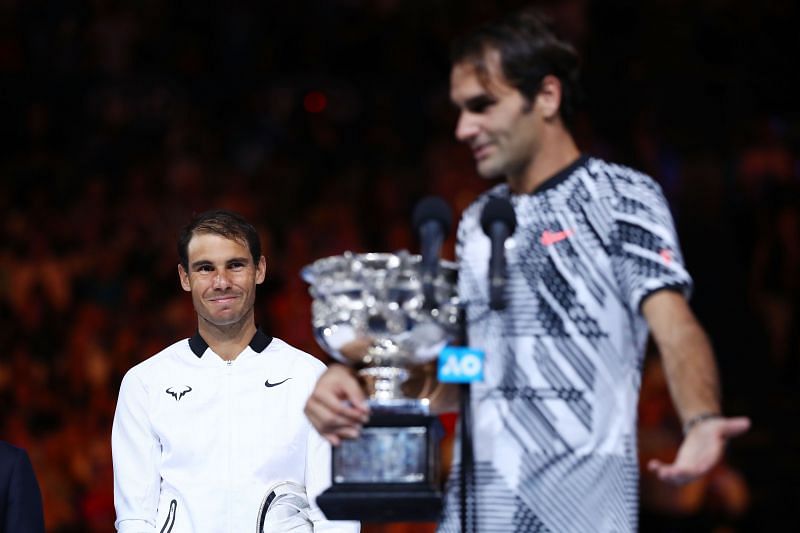
In the eyes of many, the 2017 Australian Open is the finest Grand Slam win of Roger Federer’s career. He was 35 at the time, just coming off a career-threatening injury, and had been handed a ridiculously tough draw at the Australian Open. But Federer overcame the likes of Tomas Berdych, Kei Nishikori, Stan Wawrinka and finally Rafael Nadal to win his 18th Major title.
To win in the final the way he did, that too against his greatest rival of all time - speaks volumes of Roger Federer’s tenacity during that fortnight. But it was far from easy against the mighty Spaniard, who took the match to a deciding set and at one point even led by 3 games to 1.
The Crucial Point: The score was at 6-4, 3-6, 6-1, 3-6, 5-3 15-40 on the Federer serve as he served for the championship.
Was Roger Federer showing signs of nerves? Was he going to choke like he had in the past? The answer was an emphatic 'no' as Federer saved the first break point with an ace and the next one with a cracking forehand.
That forehand was in fact not very different from the one he hit against Haas at Roland Garros 2009. In both cases it was an inside-out thunderbolt of the highest quality that left the opponent completely flat-footed.
Roger Federer eventually held his nerve and his serve to win his 5th Australian Open title (watch from 20:51).
Reason: The greatest victory in his career was at stake. After fighting so hard to get to within inches of the title, Federer was on the brink of throwing it all away.
But his forehand ensured he didn't throw it away. And in the process it helped seal a win that not only gave him renewed vigor in the latter stages of his career, but also silenced those who doubted his relevance at the top of the men's game.